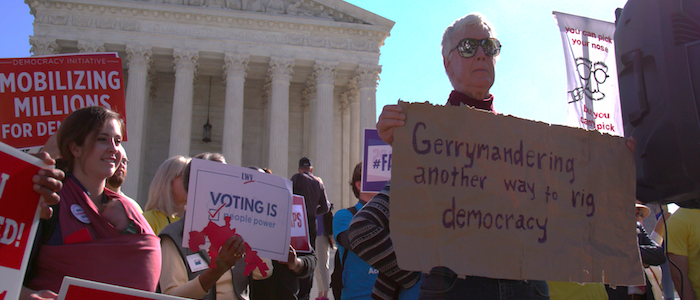
Slay the Dragon opens with the Flint Water Crisis in 2014, when officials of Flint, Michigan made a costly decision that poisoned the predominantly black residents of Flint. Brown liquid poured from household sinks, deaths occurred, and children were exposed to the contamination. The Flint Water Crisis is still to this day far from resolved. The government leadership’s laxness in fixing the problem attributed to a sense of security over their government seats. If their congressional maps guarantee them re-election, why bother with the woes of marginalized voters?
Inspired by David Daley’s book Ratf**ked, Why Your Vote Doesn’t Count, Slay the Dragon explores a method of voter suppression – other than voter ID laws, poll taxes that recently struck Florida, and shortened deadlines for absentee voters – that corrode democracy in ways easily underestimated or overlooked by those who lack political literacy.
You may or may not have read about gerrymandering from the textbooks or listened to comedian John Oliver tackle it. Gerrymandering is the act of redrawing congressional maps in order to hold the advantage in elections. In the American two-party system, Republicans and Democrats alike engage in it. But in this Trumpian era, the Republicans party have been reaping the benefits. While outlets speculated on the wan of the Republican party in the wake of Barack Obama’s 2008 presidential election win, Republican strategists saw a window of opportunity: The census was to be redone in 2010. They hatched a plan to gather data and rearrange district maps to ensure future victories in political seats that were taken for granted. Founded by Chris Jankowski, Project REDMAP (Redistricting Majority Project) begin and pro-Republican corporations poured money into future Republican gains.
Slay the Dragon finds tragedy in the inexplicable of governmental operations, starting with the environmental racism of the Flint Water Crisis and minimizing the vote of marginalized communities. There are touches of goofy observations too: Sometimes the congressional lines render awkward shapes that attract their own nicknames: Like a Snake or Goofy kicking Donald Duck. The film condemns the incrementalism of extremism as politicians establish oppressive policies they claim are for the goodwill of society, such as Scott Walker dissolving unions during this government term. A chilling still is revealed: The people of Wisconsin marching outside opposing the destruction of public sector unions while in the background sits the building where the redmapping project was transpiring in secret.
Although the film observes the proceedings plainly, a level of outrage and anxiety permeates the viewing experience. It interviews experts, from Republican and Democrat politicians and strategists; Jankowski himself; to Ari Berman, journalist at Mother Jones. But anchoring the narrative is Michiganian Katie Fahey, the founder and executive director of the People, Not Politicians grassroots campaign. With clipboards, pens, and petitions ready, she and her team set out on a mission to place an anti-gerrymandering initiative, Proposal 2, onto the 2018 midterm ballot.
Slay the Dragon can alienate by over-fixating on the voice of experts over the civilians directly affected. I felt it may have dropped the voices of the Flint Water Crisis too soon. But its selected interviewees do a succinct job at delivering a comprehensible dissection. I was most affected by a heartbreaking moment where Fahey sobs on livestream as she contemplates all their efforts could be for naught underneath an imposing system. Although her grassroots arc ends in progress when Proposal 2 is voted during the 2018 midterms, I wanted more on the mental toll that activism against a corrupt system can take.
Slay the Dragon is a necessary package for an audience studying the backstage of political strategy as well as the activism against government control. 2020 will be the crucial year that will decide whether President Donald Trump’s party will remain in extreme power as well as serving during the census year. Slay the Dragon might prepare you for the worst or best while driving you to do something about it.
/Film Rating: 7 out of 10
The post ‘Slay the Dragon’ Review: A Tough but Necessary Documentary About the Decay of Democracy [Tribeca] appeared first on /Film.
from /Film http://bit.ly/2GFdhcQ
via IFTTT
Comments
Post a Comment